News
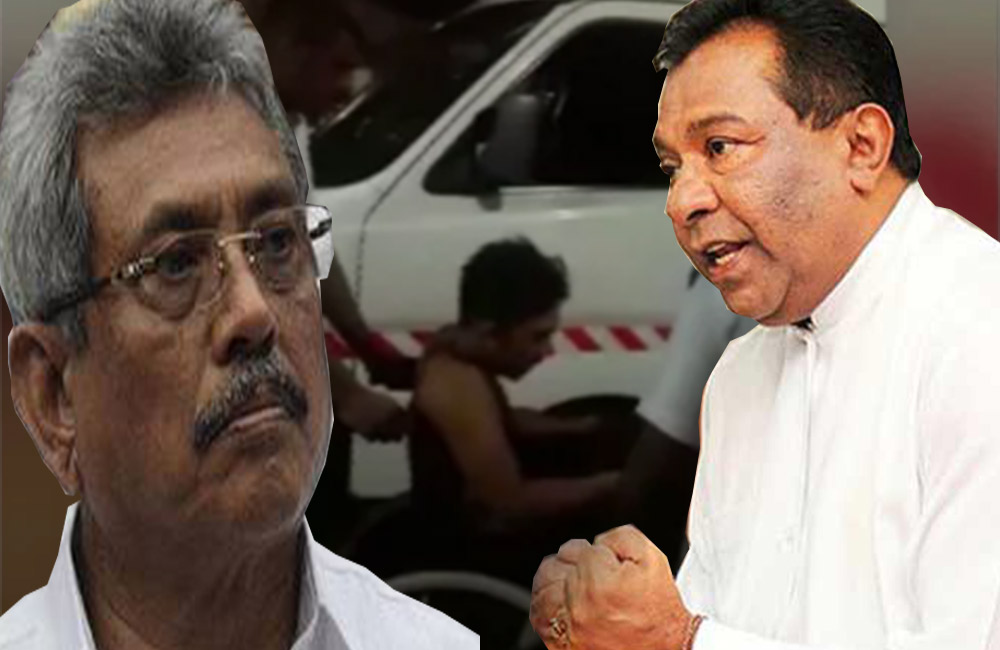
SB's security shoots two civilians in Ginigathhena
The police have said that two persons were injured after MP S.B. Dissanayake’s security personnel had opened fire to disperse a group of people who obstructed the MP’s vehicle at Polpitiya in Ginigathhena last evening.
Police Spokesman Ruwan Gunasekara has said a group of people had obstructed the MP’s vehicle at Polpitiya in Ginigathhena at about 7.30 p.m. yesterday and his security personnel in the back-up vehicle had opened fire to disperse them.
The injured were admitted to the Theligama Hospital.
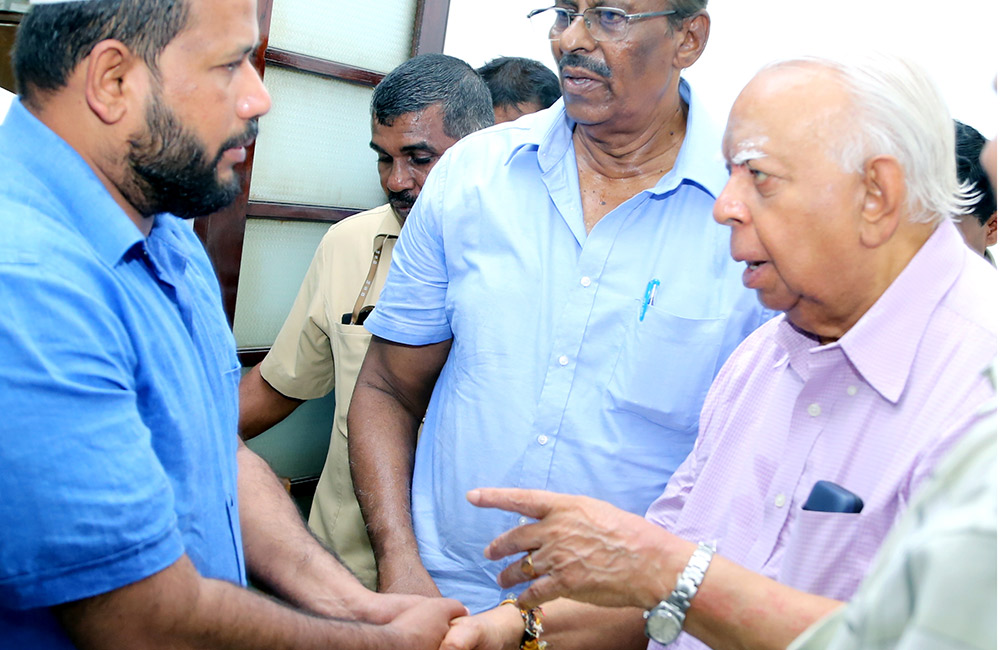
ACMC hails TNA's decision to support Sajith
The All Ceylon Makkal Congress (ACMC) hailed the decision by Sri Lanka’s leading Tamil coalition to back New Democratic Front (NDF) candidate Sajith Premadasa in the forthcoming Presidential election.
“The TNA's decision to support NDF candidate Sajith Premadasa in the Presidential election should be lauded . Their unconditional support is good news," said the Leader of ACMC, Vanni District MP Rishad Bathiudeen.
Bathiudeen was addressing an election rally in support of NDF Presidential candidate Sajit Premadasa in Salambakulam, Vavuniya on 3 November. Addressing the Salambakulam meeting, Bathiudeen reminded that Sri Lankan minorities were united during 2015 Presidential elections too.
“Tamils and Muslims supported the common candidate Maithripala Sirisena in the 2015 Presidential election and got him elected as the President. The minorities are uniting this time to elect Sajith Premadasa and he will be the winner this time,” Bathiudeen said adding that the majority of the Sri Lankan minorities now support Sajith Premadasa.
Speaking on the opposition, Bathiudeen said: “The racists within the opposition Presidential Candidate’s camp will be silenced once Sajith wins this election. They harassed Muslims after the Easter Sunday attacks to fan the flames of communalism within the majority community so that their votes would increase within the majority, thereby returning them to power.”
"If the opposition Presidential candidate wins and returns to power, the minorities of Sri Lanka should be ready to face lawless, racist tyranny", he added.
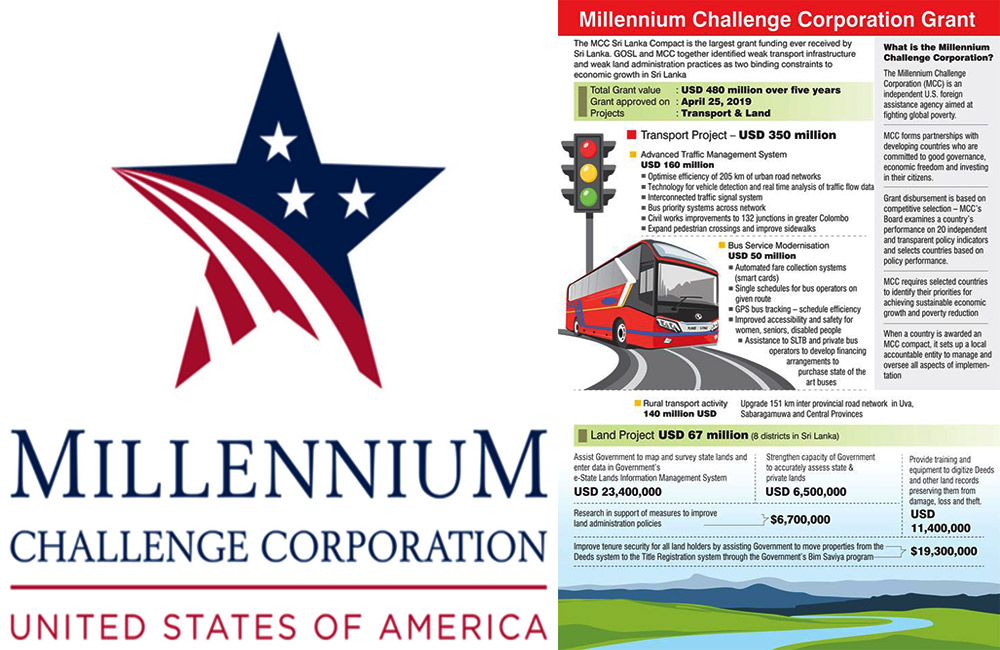
US expects MCC grant signing after parliamentary approval post presidential election
With presidential elections approaching, the United States anticipates working toward grant signing and parliamentary approval with the Government of Sri Lanka after November 16, 2019, the US embassy in Colombo said in statement today.
"Per our policy – applied in all 29 partner countries - the Sri Lankan Parliament will have the opportunity to review and approve the grant. The United States looks forward to continuing our partnership with Sri Lanka and to supporting its efforts to reduce poverty through economic growth," the statement said.
The United States said that they welcome the decision of the Cabinet of Ministers to approve the US$480 million Millennium Challenge Corporation (MCC) development assistance grant and noted that Sri Lanka requested this support, which is expected to benefit at least 11 million Sri Lankans through the funding of government- and private sector- identified needs.
The programmes supported by this grant will reduce traffic congestion, improve public transportation in Colombo, upgrade provincial roads, and expand existing Government of Sri Lanka initiatives to improve land administration and strengthen the land rights of Sri Lankans.
Sri Lankan government has posted the draft of the grant agreement on the Ministry of Finance website, where it is available for the people of Sri Lanka to review. The United States will not own or lease any land under this development assistance grant. Sri Lanka will oversee and manage all grant-funded projects throughout the implementation of the five-year grant assistance agreement.
Related News:
MCC agreement drafted with the consent of AG: Finance Ministry
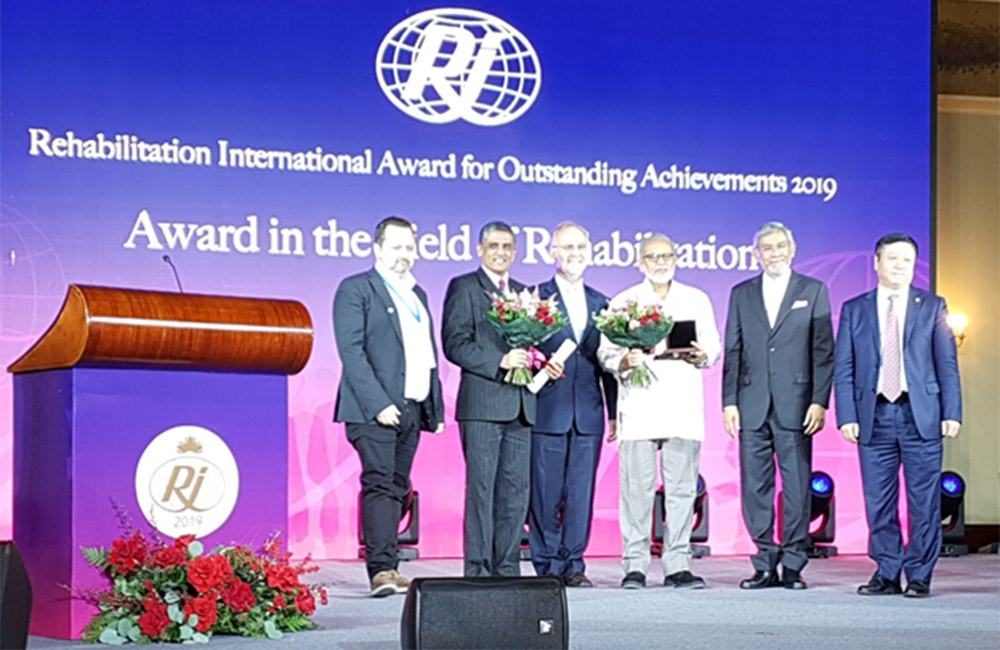
Sri Lanka Eye Donation Society wins Rehabilitation International 2019 Award in Moscow
On November 1, 2019 Mr. E.M.H.B. Moragaswewa and Mr. Wijitha Manamperi representing the Sri Lanka Eye Donation Society received an award from Rehabilitation International (RI) for Outstanding Achievements, in Moscow.
Ambassador Jayatilleka participated as one of the presenters of RI 2019 Award to Sri Lanka Eye Donation Society for Outstanding Achievements in Rehabilitation and for “bringing light to many in need”. Sri Lanka Eye Donation Society is a non-governmental organization founded by Dr. Hudson Silva, the inaugural president of the society, who launched the first campaign to collect corneas in Sri Lanka in 1958.
Today, the Eye Donation Society maintains the Sri Lanka International Eye Bank and Sri Lanka Model Human Tissue Bank, which is one of the largest in the world and donates human eyes and tissues for transplantation both in Sri Lanka and around the world.
The Ceremony took place in Metropol Hotel, Moscow and gathered representatives of international communities including UN agencies, government departments, international disability organizations as well as private sectors who are committed to disability affairs. The official part was followed by the Gala dinner and performance of China Disabled People’s Art Troupe of visually impaired musicians and hearing impaired dancers.
Ambassador Jayatilleka attended the Awarding Ceremony of the Rehabilitation International 2019 Award at the invitation of the President of the Rehabilitation International Zhang Haidi, China Disabled Persons' Federation, All-Russia Society of the Disabled and Embassy of the People’s Republic of China in Russia.
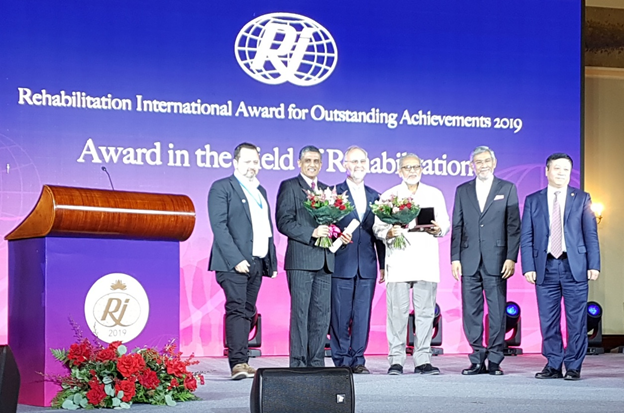
Ambassador Jayatilleka presents award to Sri Lanka Eye Donation Society
Founded in 1922, Rehabilitation International has become a global organization that empowers people with disabilities, advances their rights across the world and provides sustainable solutions towards achieving a more inclusive society for them.
The 2019 RI Award was also presented for Outstanding Achievements in Innovation to Ms. Maria Fernanda Espinosa, an Ecuadorian politician and diplomat, former President of the United Nations General Assembly for the 73rd session, Permanent Representative of Ecuador to the United Nations, Minister of National Defense and Minister of Foreign Affairs of Ecuador “for her innovative work in advancing the rights of persons with disabilities globally”.
The Ethiopian Alpha Special School for the Deaf was awarded for Outstanding Achievements in Humanitarianism “for composing symphony in the world without sound”. The school was founded in 1966 and now successfully helps deaf children to develop the practical social skills.
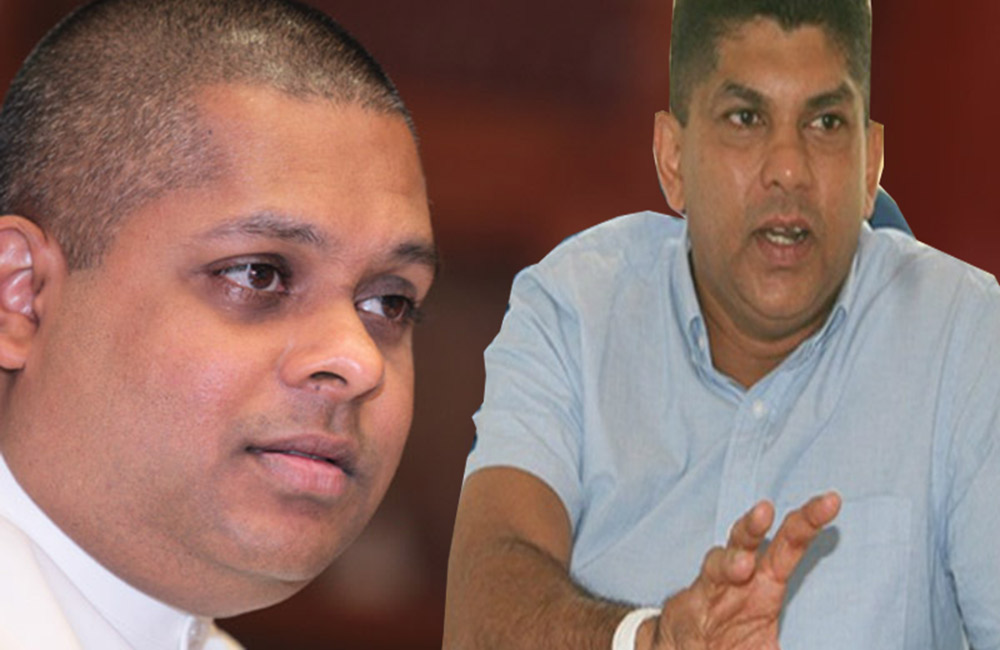
Sajin complains of death threats from Mahinda (Audio)
Former monitoring MP of the External Affairs Ministry during the Rajapaksa regime, Sajin Vaas Gunawardena has reportedly lodged a police complaint stating that Opposition Leader Mahinda Rajapaksa had told another MP of the Sri Lanka Podujana Peramuna (SLPP) that Sajin and his family will be killed if he continued to support the New Democratic Front (NDF) Presidential candidate Sajith Premadasa at the upcoming presidential election.
Sajin has told the media after lodging the police complaint that a letter describing the situation was sent to the Opposition leader.
“I worked for the Rajapaksa family for 17 years, they expelled me after filing court cases. Still, I have two court cases over money laundering charges and misusing government properties. The previous government had filed the most number of cases against me,” Sajin has said.
While reading out the letter to the media, he has said his wife had received telephone calls from a friendly SLPP MP continuously requesting him to stop helping Premadasa for the election campaign.
“I held a press briefing at Ambalangoda describing my opinion and the future of the SLFP and SLPP. After that my wife received the telephone call and said the same. Then I decided to make the complaint to the police for the protection of my wife and my children,” the former MP has said.
Sajin has added that politicians have no authority to determine the death of any person as it should be decided by nature.
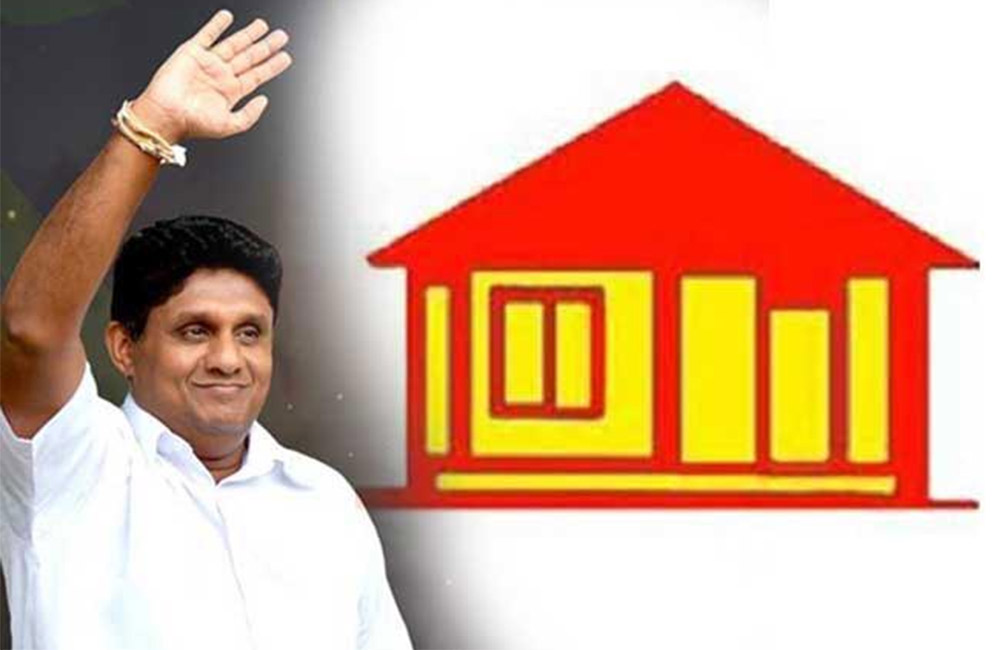
TNA pledges support to NDF candidiate Sajith Premadasa
The Tamil National Alliance (TNA) has pledged their support to New Democratic Front's Presidential candidate Sajith Premadasa as the United National Party (UNP) is continuing to woo the minority communities' support to defeat Gotabaya Rajapaksa.
The TNA is yet to officially declare its preference, but has ruled out backing the Sri Lanka Podujana Peramuna (SLPP) candidate Gotabaya Rajapaksa due to his campaign of inciting racism.
A constituent member of the TNA, the Democratic People’s Liberation Front (DPLF) had a one-on-one meeting with Rajapaksa recently and made it clear that the party was unable to endorse his candidacy.
“Tamil moderates were pleased with the annihilation of the LTTE (Liberation Tigers of Tamil Eelam), but the collective punishment for Tamils thereafter alienated the community,” a Tamil law maker said referring to the travel restrictions imposed on Tamils, the incarceration of Tamil civilians in internment camps and the enforced disappearances of tens of thousands of Tamils.
Tamil National Alliance (TNA) has pledged its support to NDF's presidential candidate Sajith Premadasa although a formal announcement has not yet been made, leader of the alliance R Sampanthan said.
Sampanthan said that the TNA had already extended its support to Premadasa and that an official statement on the matter will issued soon.
Yesterday (3), the Illankai Tamil Arasu Katchi (ITAK) – the main party in the TNA, extended its support to Premadasa.
ITAK feels Premadasa has taken into consideration some of the proposals made by ITAK in his election manifesto.
Meanwhile, delegations representing TELO and PLOTE - two constituent parties of the Tamil National Alliance (TNA), held discussions with Prime Minister Ranil Wickremesinghe today.
The discussions centred on the presidential election and the possibility of extending support to NDF candidate Sajith Premadasa.
The other two parties in the TNA coalition are expected to make their position clear in the next two days, informed political sources said.
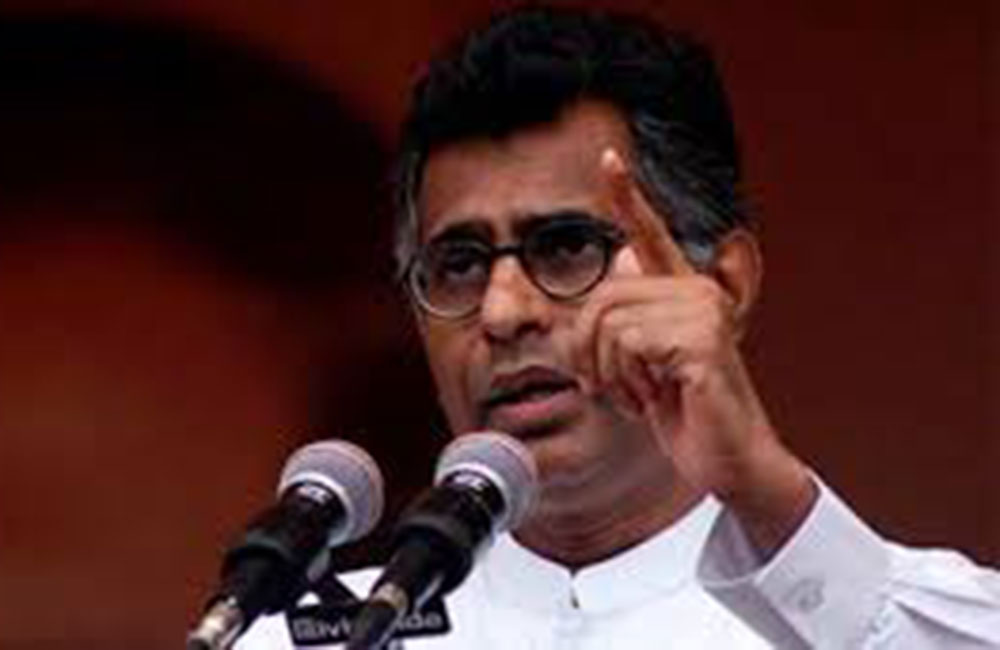
Champika defends MCC agreement; issues challenge to critics
Megapolis and Western Development Minister Patali Champika Ranawaka says the Millennium Challenge Corporation (MCC) agreement posed no threat to Sri Lanka.
Ranawaka has made this observation at a news conference.
He has challenged any one to show any clause in the MCC that was detrimental to the country.
“The US will provide us with US$ 480 million as a grant to upgrade and uplift transport system and to improve land administration,” Ranawaka has said.
"Under the transport sector, it includes advance traffic management, bus transport modernisation and central region road network,” he has further noted.
The Minister has explained that it would improve road connectivity between the central region and ports and markets in the Western Province.
Ranawaka has noted that many were blaming the MCC agreement was an American trap, but has called on those criticizing the agreement to prove it.
"We don’t want to hide the content of the MCC. It is open to the public domain," he has added.
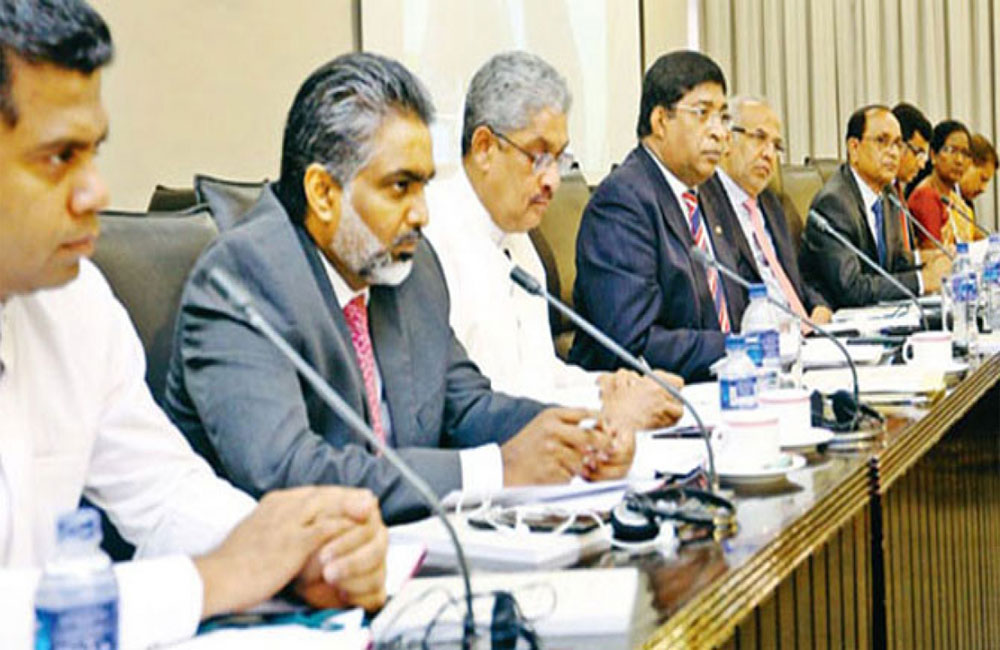
PSC recommendations to be implemented
The recommendations made by the Parliamentary Select Committee (PSC) that probed the Easter Sunday attacks in its final report are to be implemented through Parliament.
Accordingly, the report is to be debated in Parliament this week after which its recommendations will be implemented through the respective agencies.
PSC member JVP MP Dr. Nalinda Jayatissa has told the media that once the report is debated, it will be referred to the oversight committees of Parliament and the recommendations of the report would thereafter be implemented.
“The recommendations of the report must be implemented through Parliament. Parliament will refer the recommendations to the relevant ministries and departments,” Dr. Jayatissa has said.
According to him, the preliminary implementation of the recommendations will be through the Ministry of Education, Ministry of Justice, and Ministry of Religious Affairs as well as the Attorney General’s (AG) Department.
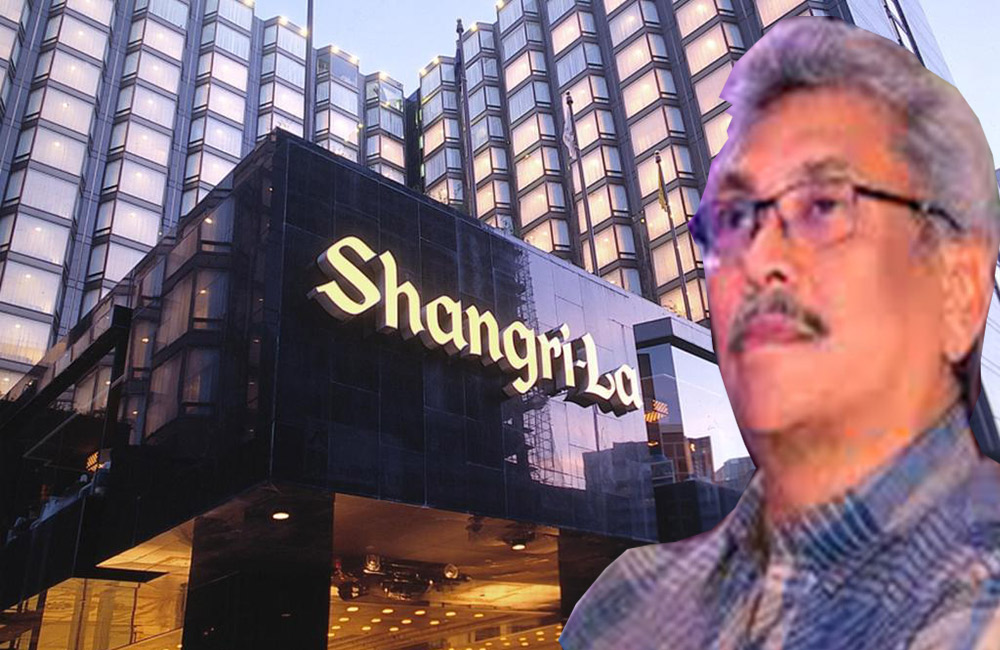
Shangri-La Colombo: the 'unofficial headquarters' of Gota's presidential election campaign
The Shangri-La Hotel in Colombo has allegedly become the ‘unofficial headquarters’ of Gotabaya Rajapaksa’s Presidential election campaign, Tamil news outlet Nilavaram has reported.
According to reports, a number of events linked to the campaign including seminars of ‘Viyathmaga’ organisation that is aligned with the Sri Lanka Podujana Peramuna (SLPP) as well as other election propaganda meetings are being held at the venue. Sajad Mawzoon, a leading businessman and a member of the Shangri-La’s Board of Directors is said to be actively leading the arrangements for the Pro-Rajapaksa events.
He is said to have taken steps to reserve the luxury suites located on the 45th floor of the hotel for propaganda purposes according to a reliable source at the hotel. It is also reported that nearly Rs. 600 Million have been collected for campaign funds from leading Muslim businessmen in the country including from Maliban Textiles and Brandix Lanka.
Meanwhile, Governor of the Western Province, A.J.M Muzammil is also said to actively collecting campaign funds on behalf of Gotabaya Rajapaksa from both Sinhalese and Muslim businessmen known to him.
But while working closely with the Rajapaksa campaign, Mawzoon also continues to keep ties with Minister of Finance Mangala Samaraweera, who is currently leading the election campaign of Rajapaksa’s main opponent, Sajith Premadasa.
While Premadasa recently met with over 1500 lawyers on the campaign trail, the dinner following the event was sponsored by Mawzoon.
It is also reported that Chairman of Brandix Lanka Ashroff Omar has commenced his own mudslinging campaign against the New Democratic Front (NDF) candidate Sajith Premadasa while extending his support to Gotabaya Rajapaksa. This propaganda campaign is being launched at yet another star class hotel in Colombo according to reliable reports.
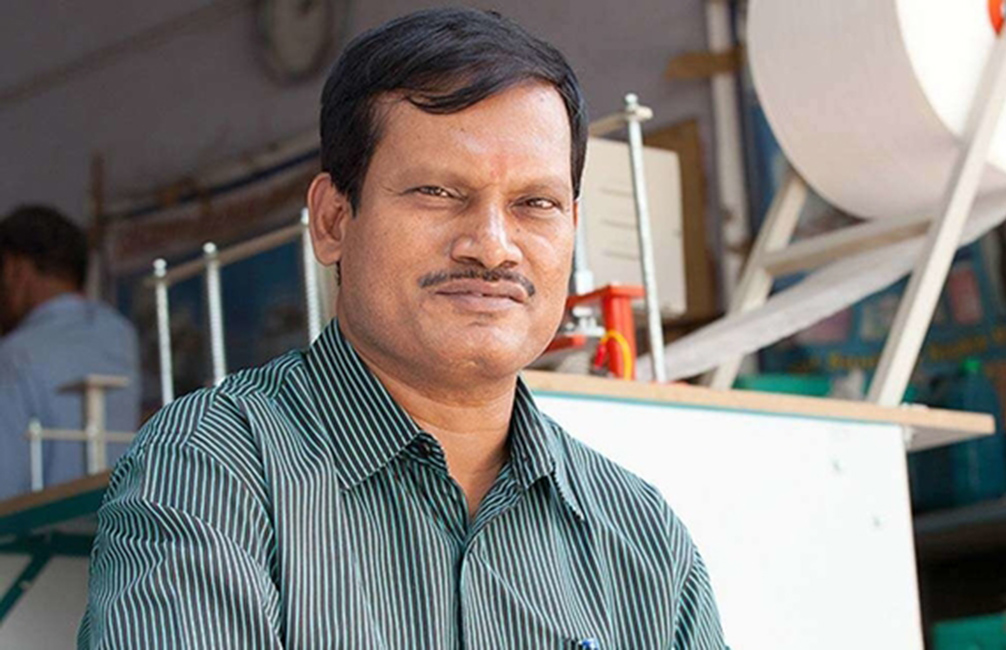
Original 'Pad Man' lauds Sajith's stance on mentrual hygiene
Indian entrepreneur and venture capitalist Arunachalam Muruganantham yesterday issued a statement highlighting NDF presidential candidate Sajith Premadasa’s staunch defence of his election promise to provide free sanitary napkins, or menstrual pads, to women and girls if elected president.
“It’s a good change to see the leaders across the world finally understood the importance of menstrual hygiene and women’s health for the development of their respective countries,” Muruganantham said in a statement posted on his Facebook page.
Premadasa made the promise last week, only to receive mockery from his opponents in the Sri Lanka Podujana Peramuna (SLPP), including being branded as “Pad Man”, a reference to a 2018 biopic based on the life of Muruganantham, who had dedicated himself to designing and developing a low-cost sanitary napkin for women and girls in India.
Responding to the criticism last week, Premadasa posted on Twitter that he “will not shy away” from his pledge or the conversation about women’s menstrual hygiene.
“If we are serious about women’s empowerment, this is a basic place to begin.” Responding to his being branded as “Pad Man”, Premadasa said he “would wear this label proudly.”
His pledge, and his public defence of it against vicious backlash from his opponents, won Premadasa substantial public support for being the first political candidate to address a women’s health issue deeply steeped in stigma. The public spat led to calls for the original “Pad Man” movie to be made available in Sri Lanka. Referring to Premadasa’s stance, original “Pad Man” Muruganantham said “it is high time the leaders of nations became the ambassadors for menstrual hygiene awareness.”
One television station, ITN, had announced plans to air the “Pad Man” movie in view of the soaring public interest, but a complaint has been filed with the Elections Commission seeking to block the film from being aired by ITN on the grounds that it would unfairly promote the campaign of a presidential candidate.
The recommendations made by the Parliamentary Select Committee (PSC) that probed the Easter Sunday attacks in its final report are to be implemented through Parliament.
Accordingly, the report is to be debated in Parliament this week after which its recommendations will be implemented through the respective agencies.
PSC member JVP MP Dr. Nalinda Jayatissa has told the media that once the report is debated, it will be referred to the oversight committees of Parliament and the recommendations of the report would thereafter be implemented.
“The recommendations of the report must be implemented through Parliament. Parliament will refer the recommendations to the relevant ministries and departments,” Dr. Jayatissa has said.
According to him, the preliminary implementation of the recommendations will be through the Ministry of Education, Ministry of Justice, and Ministry of Religious Affairs as well as the Attorney General’s (AG) Department.
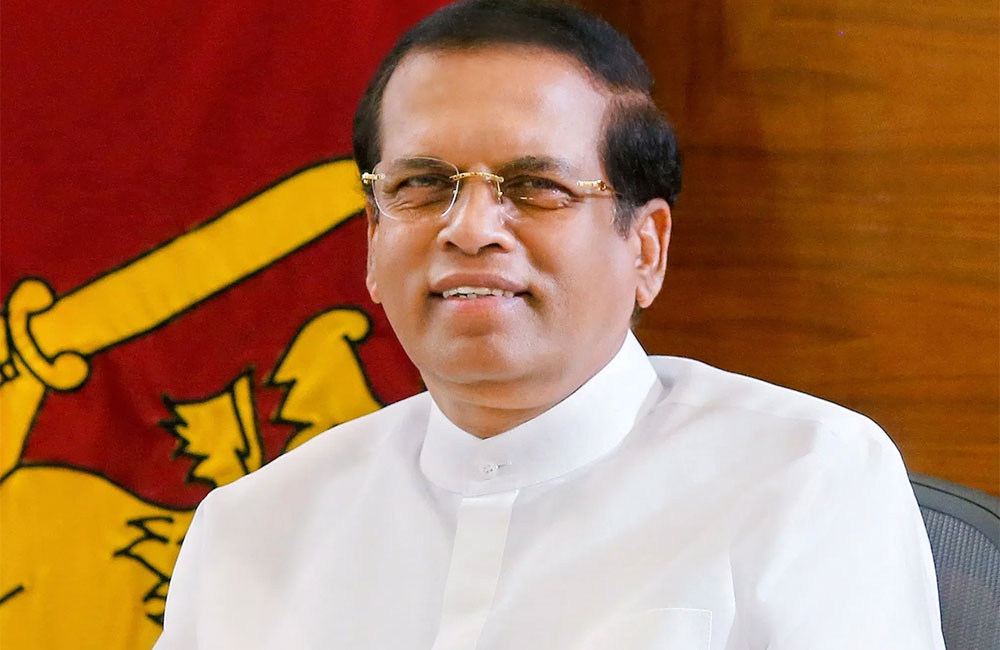
President explains restoration of democracy in a few years
President Maithripala Sirisena referring to the restoration of democracy in the country during the past few years has noted that the current free, fair and peaceful presidential election campaigns were a reflection of the strength of democracy in the country.
Sirisena has made these observations after accepting credentials from three new envoys to Sri Lanka at the President’s House in Colombo yesterday (4).
The President has said democracy was restored due to a broad political transformation that had taken place in the country.
Ambassador of the Lebanese Republic, Rabie Narsh, Ambassador of the Federal Republic of Nigeria, Maj Gen Chris Eze, and Ambassador of the Delegation of the European Union, Denis Chaibi have presented their credentials to the President.
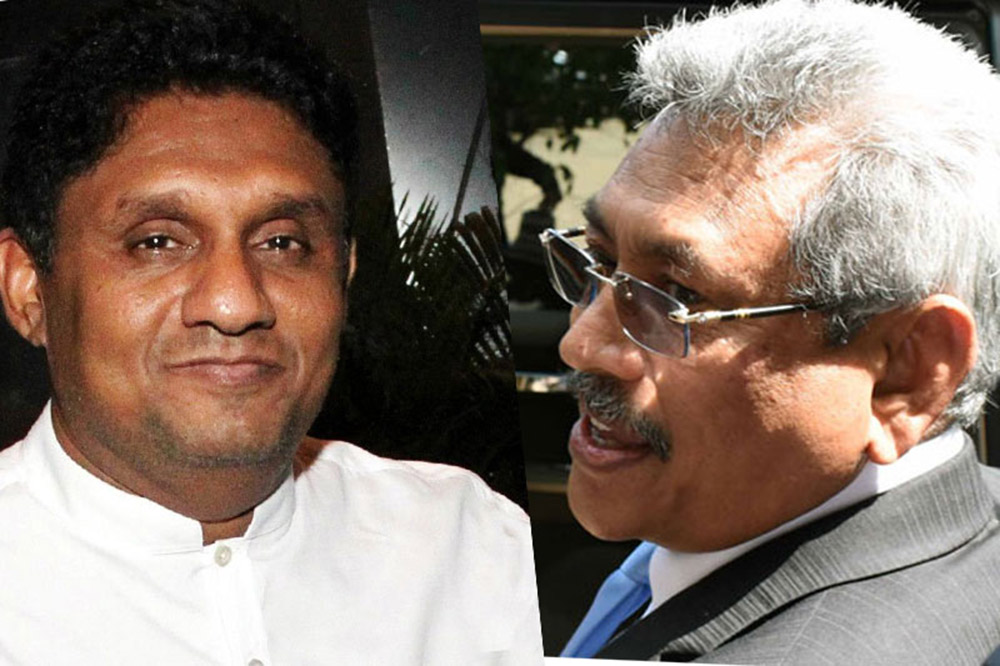
Sajith sends written challenge to Gota for presidential debate
New Democratic Front (NDF) presidential candidate Sajith Premadasa has in writing challenged Sri Lanka Podujana Peramuna (SLPP) presidential candidate Gotabaya Rajapaksa to a presidential debate.
Premadasa in the letter to Rajapaksa has noted that it was the democratic right of the citizens to be well informed about their choice of Presidential candidates.
“In modern democracies around the world, presidential candidates fearlessly debate their policies at impartially moderated debates. Today such events are broadcast live on television and social media. There is no better opportunity for people to weigh candidates’ abilities, character and vision,” Premadasa has said in the letter.
Premadasa has observed that he had issued the challenge initially last Wednesday but had not received any response from Rajapaksa.
“On Wednesday, I invited you to take up the challenge of facing the nation at such a debate. Unfortunately, I am yet to receive a response. Some of your advisers have alluded to the absence of a formal written invitation, even in this age of technology and digital communication,” Premadasa has added.
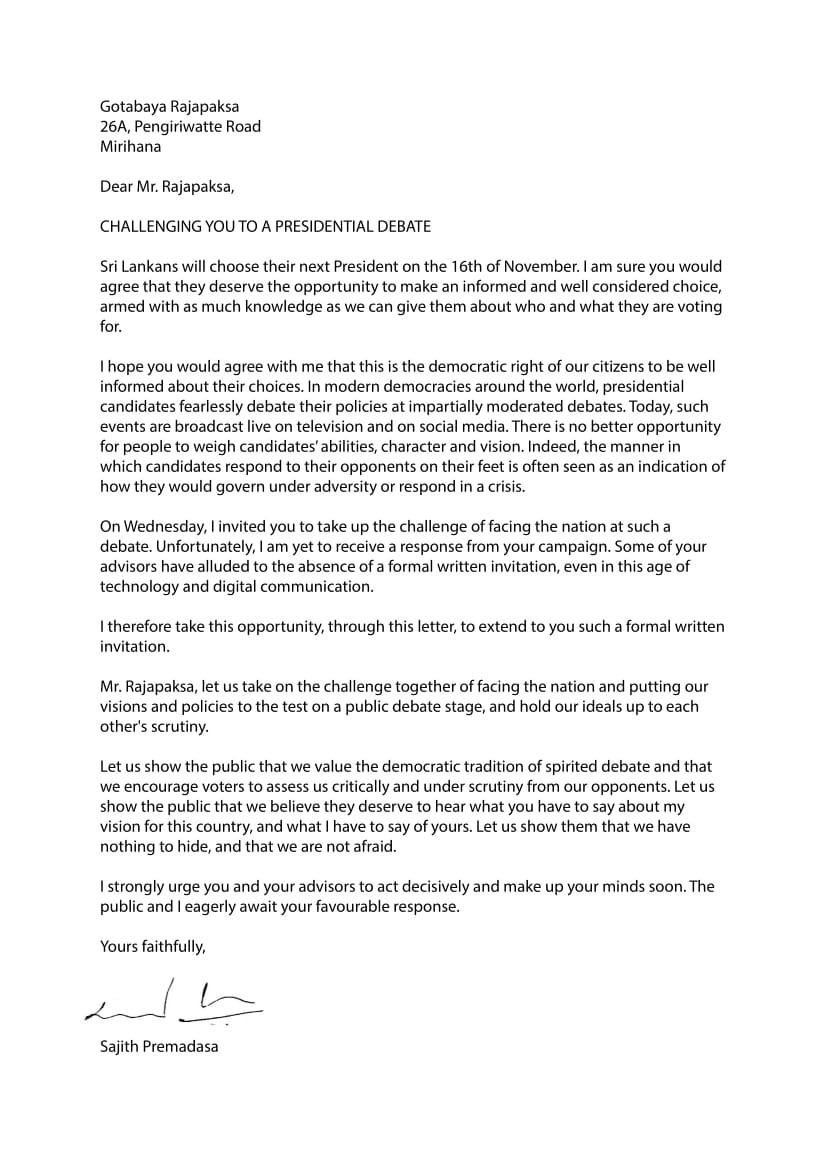
Page 418 of 663